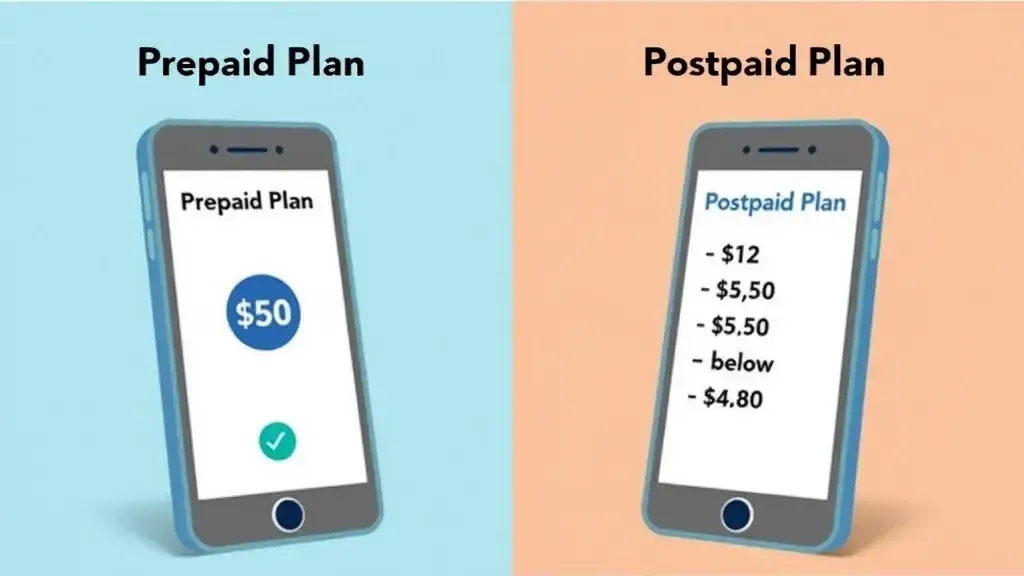Luis Rafael•Sep 18, 2024
Choosing the right mobile plan can be tricky with so many options available. You might feel lost by the details. Do you need the freedom of a prepaid plan or the convenience of a postpaid plan? Your decision depends on your personal preferences, usage habits, and budget. However, here’s a breakdown of the key differences between postpaid vs. prepaid mobile data plans to help you find the best fit for your lifestyle.

In this article:
- Prepaid Mobile Plans
- Postpaid Mobile Plans
- Prepaid vs. Postpaid Comparison
- Choosing the Best Plan for Your Needs
- Frequently Asked Questions
Prepaid Mobile Plans
What Are Prepaid Mobile Plans?
Prepaid mobile plans are those whereby clients pay for services upfront. Before you use your phone, you buy credit or a plan, so you avoid unexpected charges. With a prepaid plan, you can top up your credit as needed, allowing you to control your spending. Prepaid mobile plans are a popular choice for many users because there are no long-term contracts and it’s easier to manage usage.

Benefits of Choosing Prepaid Mobile Plans
Prepaid mobile plans hold a certain attraction to those who actually want to avoid monthly bills or any other hidden fees connected with them. The key advantages of postpaid vs prepaid include:
- No Contracts: You can stay contract-free. This lets you switch providers or plans without fines.
- Spending Plan Control: Since you’re paying in advance, you can’t overspend. There won’t be any surprise fees at the end of the month.
- No Credit Check: Unlike postpaid plans, most prepaid ones don’t require a credit check. So, these services are now available to more users, especially those with poor credit histories.
Common Prepaid Plan Features
Most prepaid plans will, of course, provide talk, text, and a set amount of data. But with some prepaid ideas, there is even an inclusion for add-ons, such as International calling or extra data packs. Here’s what you can usually expect:
- Pay-As-You-Go Data: You use what you pay for, and once it runs out, your option is either topping it up or waiting for the cycle.
- Freedom: We offer plans of various lengths, ranging from daily to monthly. One can choose what works at the time.
- Basic Features: Most often, prepaid plans are available with unlimited talking and texting options. However, you can limit the amount of data usage based on the selected package.
Postpaid Mobile Plans
What Are Postpaid Mobile Plans?
Postpaid mobile plans require you to pay for services after you’ve used them, typically at the end of each billing cycle. You’ll receive a bill each month that details your usage and charges. Postpaid plans often come with a range of services, such as high data limits, international roaming, and even device payments.
When deciding between postpaid and prepaid, consider your phone usage and the features you need.

Advantages of Postpaid Plans
Postpaid plans are often preferred by heavy users who value the convenience of a regular monthly bill and dislike the hassle of topping up credits. Here are some key advantages of postpaid plans compared to prepaid plans:
- Higher Data Limits: Compared to prepaid, postpaid plans usually include more data at high speeds.
- Extra Benefits: Most postpaid plans include added services. These are subscriptions to free streaming services, international roaming, and priority customer help.
- Regular Billing: You have an estimated monthly bill, which will end up cheaper if you use your phone frequently.
Typical Features of Postpaid Plans
In most cases, postpaid plans come with the following features, targeting clients in need of reliable and wide mobile services:
- Unlimited Data or High Data Limits: Many postpaid plans offer this. It helps heavy users or professionals who need to be online all the time.
- Included Services: Some packages include streaming services, cloud storage, and discounts on new phones.
- International Roaming: Many postpaid plans allow international roaming. This is helpful for regular travelers.
Prepaid vs. Postpaid Comparison

Upfront Costs and Monthly Billing
The only real difference between the two is exactly how one pays for his service. Pay-as-you-go plans are prepaid—in other words, you are paying in advance, whereas postpay customers pay at the end of the month when the bill hits. For those who would not want huge unpredictable bills, prepaid is the way to go. Alternatively, postpaid plans may have fixed monthly charges. They may also apply extra charges for exceeding your data or usage limits. In the postpaid vs prepaid comparison, this can be a key deciding factor.
Plan Flexibility and Customization
Prepaid plans are very free. You can change your plan at any time, without a contract. You can switch to a cheaper plan to save money or add more data as needed. With postpaid plans, you usually have a bit more structure and often fewer options to modify your plan mid-contract. If freedom is key for you, then it is time to go prepaid.
Contract Requirements
Also, the level of promise is a key factor in the prepaid vs postpaid debate. Quite generally, there are no contracts involved in the area of prepaid plans, which makes them ideal for users who do not want to get tied down. In contrast to this, postpaid plans more or less involve agreements, ranging between 12 months and 24 months. This agreement will likely have an early cancellation fee. So, if you want to avoid fees, make sure to prepare for a long-term promise before selecting a postpaid plan.
Service and Support Differences
The level of customer help can be very different for prepaid and postpaid alike. As a rule, users with postpaid plans have better help services, and they can easily pass through the queues in the customer help. Also, postpaid plans have extras. They include premium help and exclusive offers. Prepaid customers might have limited help. These plans are simple options.
- Customer Help Levels: Postpaid subscribers usually get better help services. That’s why they are the chosen option for business professionals and fast-moving individuals.
- Extra Benefits: Sometimes, postpaid plans have free extras. These may include upgraded access, discounted tickets to exclusive events, or free streaming services.
- International Roaming Choices: Regular travelers should choose post-paid plans. The package includes better international roaming that they offer. Sometimes, you have to spend extra money on prepaid options, or you may experience limited functionality when traveling abroad.
How to Choose the Best Plan for Your Needs
Assess Your Usage Patterns
First, consider your usage when choosing between prepaid and postpaid. In case you are someone who doesn’t use their phone much and just needs their phone for an occasional call or text, you will find a prepaid plan much cheaper. For heavy data users and those using phones for work, postpaid plans are better. They offer more data and extra features.
Consider Your Budget
Your financial situation will also largely affect your decision. If you like having full control over how much you spend and not having to deal with bills every month, then prepaid is what you should get. If you can afford a fixed monthly payment, postpaid services are better. They are more convenient and full of features, but they cost more. You may want extra service.
Make an Informed Decision
Ultimately, the choice between a prepaid and a postpaid mobile plan is a matter of personal preference. Do you want ease or freedom? Do you want ease and extra features, or do you want control? Your usage, spending plan, and requirements will help clearly make the right decision.
Frequently Asked Questions
Is there a difference in coverage between prepaid vs postpaid?
Prepaid and postpaid plans use the same networks. So, their coverage is usually identical. If there happens to be heavy congestion, though, postpaid subscribers may have priority service.
Can I switch from postpaid to prepaid?
Yes, most carriers will let you switch between postpaid and prepaid. But, you may need to meet your contract obligations.
Which is better for international travel, prepaid or postpaid?
Postpaid usually has better international roaming than prepaid. Prepaid may need extra data or roaming packages. Also, if you are considering traveling abroad, you may want to take a look at this article.
Are postpaid plans more expensive than prepaid plans?
Most postpaid plans are expensive but have many features. Prepaid plans are cheaper upfront. But, long-term users can get postpaid plans at a lower cost if they want more data.
Do prepaid plans come with unlimited data options?
Some carriers offer unlimited data for prepaid plans. But, these options are often more limited. They may throttle speeds after a certain usage threshold, unlike postpaid plans.
Conclusion
No single solution fits all when it comes to prepaid versus postpaid mobile plans. A prepaid gives you complete flexibility and control over costs. This is great for groups with low or variable usage. Postpaid plans, on the other hand, are better suited for customers who seek comfort, advanced facilities, and high data limits. Once you know your habits and budget, you can find a plan that suits your lifestyle.
